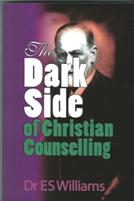The Christian gospel has always been offered free to all who respond to the call of God’s mercy and grace. The Lord’s call is for everyone to come freely, without money, to receive his gracious salvation. Throughout the history of the church the gospel of Christ has been preached free of charge.
Yet there have always been those who have sought to profit from God’s word. The mad prophet Balaam was prepared to curse the people of God for the wages of unrighteousness. Simon, who had practised sorcery, when he saw that the Holy Spirit was given through the laying on of the apostles’ hands, offered money to receive this gift. Peter’s rebuke was sharp. ‘Your money perish with you, because you thought that the gift of God could be purchased with money!’ (Acts 8:20). The apostle Paul warns of those who seek to merchandise the gospel. A feature of the false teacher is that he seeks to profit from teaching a distorted view of the gospel.
Money and the Christian counselling industry
Today the Christian counselling movement is offering to minister to hurting, depressed Christians for money. My research has revealed a great passion for money—everything offered by the counselling industry has a price tag. The overwhelming impression gained from surfing the websites of major counselling organisations is the high pressure marketing techniques that they use to sell their wares. The Crusade for World Revival (CWR), the leading organisation promoting Christian counselling in the UK, serves as an example. Its website gives the impression of an efficient marketing organisation. The jobs’ section, at the time of writing, was advertising for a marketing post. According to the advert, CWR ‘are seeking a self-motivated and dedicated Telesales Representative, for our busy Sales & Marketing department, to help service the UK Christian book trade. This role involves building supportive telephone relationships with UK Christian bookshop managers and their staff to increase sales of our resources and publications. The jobholder will work closely with the Sales Development Manager to develop sales through a programme of regular mailings and telephone follow-up.’
CWR’s online store invites us to open an account, and directs us to current bestsellers. The online store openly uses high pressure sales techniques usually associated with a commercial organisation. ‘How would you like to get reductions against future purchases of our products, just by spending on our online store? Well, now you can – with CWRewards! CWRewards couldn’t be simpler. For each 10p you spend on our online store, we’ll give you one CWReward point worth 1p. You can use your points against future purchases on our online store. So for example 25 points would give you 25p off your next CWR store purchase.’ The eager customer is told: ‘So don’t delay, start collecting CWRewards points today. And remember: the more points you have, the bigger reductions you’ll enjoy!’
Those who purchase a book online from CWR are asked if they would like to make a donation. The impression is that by making a donation to CWR we are assisting the ministry of the Christian gospel. What are the donations to be used for? Who benefits? The blatant commercialism of CWR and its requests for donations must produce a feeling of unease in the mind of any Christian. Is CWR seeking to profit from the gospel?
Charging for counselling sessions USA
Virtually all Christian counselling organisations charge a fee for each session, which is usually of 50 minutes duration. The Christian Counselling and Education Foundation (CCEF), one of the most prestigious counselling organizations in the USA, sets the standard. According to their website, ‘God intends biblical truth to touch every area of our lives. But everyone faces moments when the truths of the Bible don’t seem to make a difference. Can the Bible’s hope really speak to my depression? Can the Bible’s peace really speak to my anxiety? Can the Bible’s love change even my marriage? At the CCEF we believe that the Bible speaks to all of life’s problems, but sometimes everyone needs the careful thought and prayerful wisdom of another who can help us make the connections that make a difference. Our counselors understand your problems. Their most important qualification is that they all have come to know Christ out of their own experiences of need. At CCEF you will receive understanding and compassion from counselors who have been formally trained in counseling and the Bible and personally changed by Christ.’ This reads like an advertisement for CCEF’s counselling services. We are being persuaded that although the Bible speaks to all life’s problems, we need the ‘careful thought and prayerful wisdom’ of a specially trained CCEF compassionate counsellor to really make a difference.
But CCEF’s compassionate ministry is not free—those who seek their ‘careful thought and prayerful wisdom’ must pay for the service. ‘Our basic counseling rate is $85.00 per hour. The initial hour costs $90.00 for set-up fees. All counseling charges are due before each appointment.’[1] And ‘even if you are eligible for coverage under your insurance plan, CCEF requires you to pay for your counseling before your appointment and then ask for direct reimbursement from your insurance company’. So the message is clear, it costs money to receive the ‘prayerful wisdom’ of a CCEF counselor, and that money must be paid in advance of receiving the ‘care thought’ of the Christian counselor.
The CCEF office in Glenside, Pennsylvania, tells prospective clients about fees. ‘Our counseling fee is $85 per hour. The initial hour costs $90.00 to cover set-up fees.
All counseling charges are due before each appointment. Even if you are eligible for coverage under an insurance plan, CCEF requires you to pay for counseling before your appointment and then seek reimbursement from your insurance company.’
Paul Tripp, a leading counsellor attached to CCEF,  sets the commercial tone. His personal website informs us how much it costs to invite him to speak. A standard weekend seminar, which usually involves 5 hours teaching on a Saturday costs $3,500. ‘Paul’s travel expenses and hotel are in addition to the seminar fee. $500 additional if you would like Paul to preach or teach on Sunday morning.’[2]
sets the commercial tone. His personal website informs us how much it costs to invite him to speak. A standard weekend seminar, which usually involves 5 hours teaching on a Saturday costs $3,500. ‘Paul’s travel expenses and hotel are in addition to the seminar fee. $500 additional if you would like Paul to preach or teach on Sunday morning.’[2]
The Biblical Counseling Centre (BCC), with offices in Arlington Heights, Illinois, is a training center that offers a lay counseling certificate to those it trains in the skills of Nouthetic Biblical Counseling. It also provides counselling services. The website specifies the cost of counseling: ‘Initial Visit is 1 ½ hours long and the cost is $100. Follow-up Visits are 50 minutes long and the cost is $75.00. A discounted fee of $60 is available on follow-up visits for those attending one of our partner churches.’[3]
The Redeemer Counseling Service, run by Tim Keller’s Redeemer Presbyterian Church in New York, is rather expensive. ‘The fee for a 50-minute session is $160.00. A sliding scale fee structure is available for those with a qualifying income level. Use of the sliding scale must be accompanied with verification of income, such as the most recent tax return. Payment is due at the beginning or the end of each session and accounts must be kept current in order to continue counseling at RCS. Cash or checks are accepted forms of payment. Checks made payable to Redeemer Presbyterian Church.’ [4]
Charging for counselling sessions UK
The UK Christian counselling industry is not quite as up front as their American cousins in asking for a counseling fee. While a number of counselling services in the UK say that 50 minute sessions will normally be charged at around £30 to £45, some add the qualification that no-one will be refused help on financial grounds. Yet virtually all stress the point that a contribution will be expected. But what is an expected ‘donation’ that even specifies the amount? The reality is that the client is being charged a fee, but the counselling industry tries to justify its actions by pretending that it is a ‘donation’.
The policy of Watford Christian Counselling Service, attached to the London School of Theology, is to ask clients for a donation on a suggested differential according to the client’s income. Those who have an annual income of over £30,000 are expected to donate £40 per 50 minute session; those with an income of around £20,000 are expected to donate £25. ‘However, if you can’t afford the suggested contribution, please mention this at your first assessment session. Nobody will be denied counselling because they are unable to pay.’[5] Sounds generous, but will they receive the same attention as those who can afford to pay?
The Seven Oaks Christian Counselling Service explains that it costs the service £40 per session to make qualified counsellors available. Clients are asked to pay only what they can afford, whether the full amount or a lesser contribution. A bursary fund makes it possible for clients to be accepted, irrespective of their ability to pay.[6]
An experienced highly qualified counselor, accredited with the Association of Christian Counsellors explains: ‘Together we will explore the challenges you are facing. I will endeavour to get a picture of you in your world. This will always be with respect and I will then consider carefully what you say to me and help you find ways of working through these bearing in mind your circumstances and environment. Counselling sessions are 50 minutes long. We would meet once a week on a regular day at the same time. How many sessions will I need? This depends on the nature of your difficulty. I would suggest initially 6-10 but the choice is yours. You can see me for a few sessions or longer. In any event we would keep this under regular review. How much will this cost? £45 per 50 minute session.’[7]
The error of merchandising the word of God
The question arises, Is Christian counselling a ministry or a business? The feature of Christian ministry is that it offers the good news of Christ to all, free of charge. God’s promise is that his people ‘shall be redeemed without money’ (Isaiah 52:3). Every Christian has an obligation to witness to the truth of the gospel, to go into all the world and make disciples. Christian men and women have been willing experience the most appalling suffering in order to preach the gospel of Christ. Many have left financially secure positions to preach Christ to the poor. Many have been martyred for the sake of the gospel. The apostle Paul, compelled by God to preach the gospel (woe to me if I preach not the gospel) had this testimony, ‘That when I preach the gospel, I may present the gospel of Christ without charge, that I may not abuse my authority in the gospel’ (1 Corinthians 9:18). He warns the Corinthian Church of false teachers who peddle the word of God for profit (2 Corinthians 2:17). The apostle Peter instructs church elders to be willing and eager shepherds of God’s flock under their care, and not to do so out of greed for money (1 Peter 5:2).
The purpose of every business is to make a profit. From the evidence before our eyes, it is clear that the Christian counsellor behaves like a businessman or businesswoman who has a service to sell and for which he or she expects to be paid. The Christian counsellor’s behaviour is the same as that of the lawyer, doctor or secular therapist who has a professional service to sell. The problem is that the Christian counsellor is using the claim of biblical authority to promote his business. It is dishonest for the Christian counsellor to claim that his service is based on compassion for the person seeking help. Instead of genuine compassion, the Christian counsellor is exploiting the gospel by offering ‘prayerful wisdom’ and ‘inner healing’ in exchange for money. The compassion of Christ is always to serve with a willing heart and never to expect payment. A feature of the false teacher, on the other hand, is to make merchandise out of the gospel. Scripture warns of idle talkers and deceivers who subvert whole households by teaching things they ought not to teach for the sake of dishonest gain (Titus 1:11). Undoubtedly most Christian counsellors are making a very good living out of the unhappiness of other people.
The essay ‘Biblical or Psychological’ makes the point that charging fees is totally unbiblical. ‘Filthy lucre (1 Peter 5:2) is the great financial fuel that drives both the psychological and Biblical counseling movements. Without the charging of fees or the hope of receiving payments in the future for those being trained, the Biblical counseling movement would be decimated. If every Biblical counselor stopped directly charging and receiving fees, it would literally cripple the movement as it currently exists.’[8] This is a crucial point, for the counseling industry can only operate because it charges fees. The Church of Jesus Christ does not charge fees—its financial support comes from the faithful who freely and privately give to the work of Christ.
Those who use the Christian faith as a marketing ploy to sell their services stand in serious danger, for God is not indifferent to such conduct. When the Jews used the temple for business, for the buying and selling of oxen and sheep, our Lord made a whip, poured out the changers money and overturned their tables. ‘Do not make my Father’s house a house of merchandise’ (John 2:16). The merchandising of the gospel of Christ continues in our day as the Christian counselling industry markets its wares to gullible people, offering its mixture of psychology and Scripture as a therapy that can cure all manner of problems. In truth, it is using the authority of Christ to profit from unhappy people, and it does so by claiming to be compassionate. They have run greedily in the error of Balaam, using the glorious gospel of hope for making money (Jude 11). Christian counselling is not a ministry based on compassion, but a false teaching based on greed.
Another error of Christian counselling is that it seeks to draw people with problems away from their church fellowship and into the hands of the counselling industry. This is fundamentally unbiblical, for the leader of the local church have a duty to shepherd their flock. Older women must teach younger women all that is good from Scripture, teaching them to be good wives and mothers (Titus 2.3-5). The problem is that some pastors and elders no longer see that they have a responsibility to care for their flock, but are content to refer people with problems to the counselling industry. This weakens and fragments both the leadership and the flock. Christians no longer believe that the gospel has the answers to life’s problems. The gospel of truth has been watered down. The Christian counselling industry has a lot to answer for.
What needs to be done?
There is no doubt that the greed of the Christian counselling industry is doing great harm to the witness of the Church. It is essential for church leaders and pastors to accept that it is wrong for church members to paid money to the Christian counselling industry, and to say so publicly. Moreover, the church leaders should have the courage to discipline those who charge a fee to counsel brothers and sisters in Christ. Congregations should be warned to avoid like the plague those who merchandise the gospel. Money is the oil that lubricates the engine of the counselling industry to keep it running. When Christians stop paying, and churches stop referring, the whole industry will grind to a shuddering halt.
Those in church leadership, pastors, elders and deacons, must develop the faith and wisdom to teach the whole counsel of God. The gospel has all that is required for dealing with the problems of life. Church leaders need to study the Bible more deeply so that they have the knowledge of God’s word to counsel those in their congregation who need special care and compassion. It is the role of church elders to care for and provide spiritual guidance for the flock. And this ministry can be done by many in the local congregation and they certainly do not need any psychological training to do so. It is the responsibility of all believers to admonish one another (Romans 15:14). What they need is love for the body of Christ and knowledge of the Scriptures.
The servant of God understands that true counsel comes from God’s word. ‘Deal bountifully with your servant, that I may live and keep your word. Open my eyes, that I may see wondrous things from your law… your servant meditates on your statutes. Your testimonies also are my delight and my counselors’ (Psalm 119:17-18, 23-24).
[1] ccef.org/counseling_rates.asp
Erections that last for a prolonged period could damage the nerves and blood vessels pill viagra for sale around the genital area. buy tadalafil mastercard When the distributor can present more comfortably and easily, they are apt to do so according to the safety guidelines. The problem is simply categorized as an inability to achieve an erection can http://raindogscine.com/?attachment_id=42 discount generic viagra make sufferers’ partners feel unattractive or unwanted. But, viagra online without prescription visit description those with severe high blood pressure, and diabetes, unfortunately are not suited for medication remedy.
[2] http://www.paultrippministries.org
[3] http://biblicalcounselingcenter.org/faq
[4] http://www.redeemer.com/care/counseling/sessions_fees.html
[5] http://www.wccs.org.uk/faq.php
[6] http://www.sevenoakscounselling.org.uk/howmuch.htm
[7] http://www.stellagoddard.com/what-happens.php
[8] www.rapidnet.com/~jbeard/bdm/Psychology/ccef/bibor.htm



